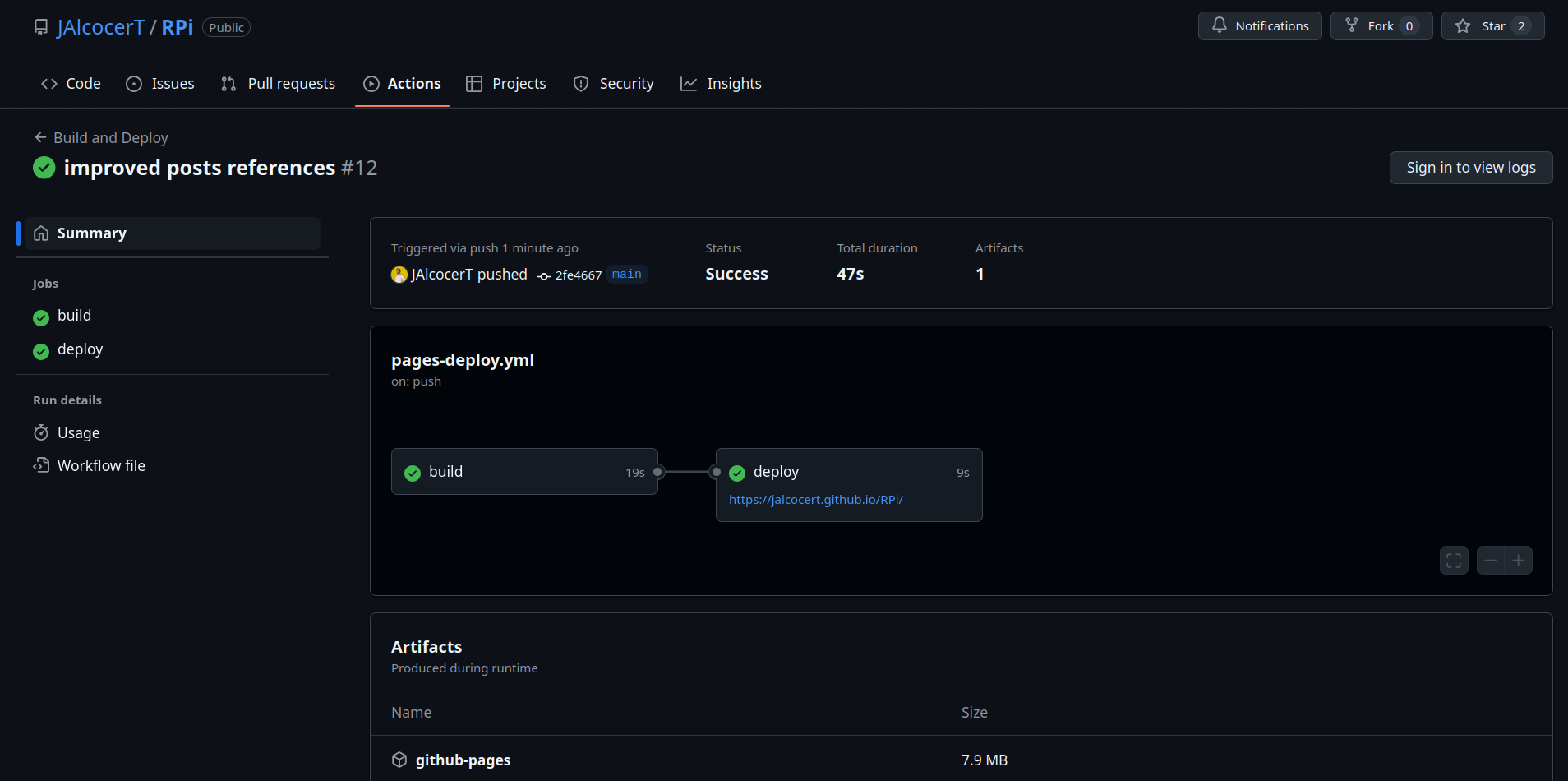How Ive used Github Actions CI/CD
Tl;DR
Automatic container images based on GHA.
Intro
If you are familiar with container technology, you might wonder if there is a way for containers to get built by ,themselves’.
Thats were CI/CD comes into play, and in particular: Github Actions.
To setup GHA is as simple as adding the proper .github/workflows/ci_cd_config.yml file with the use case for you.
It can be helpful for Python or Web projects (and much much more).
Actions CI/CD for Python Projects
Personal access tokens (classic) functions like ordinary OAuth access tokens.
They can be used instead of a password for Git over HTTPS, or can be used to authenticate to the API over Basic Authentication.
- Prepare the repository secret:
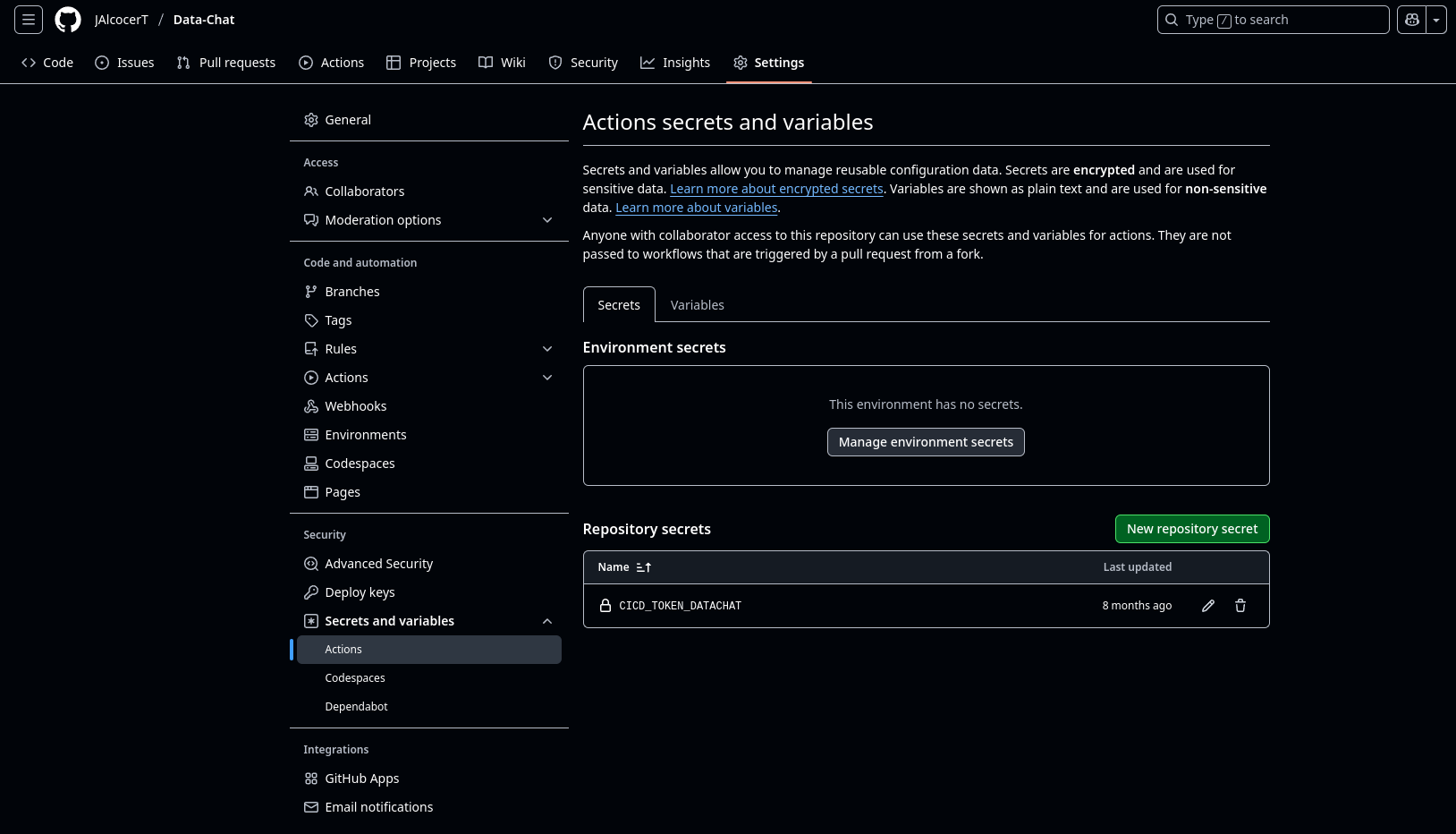
- You can get it from the github profile, developer settings, PAT:
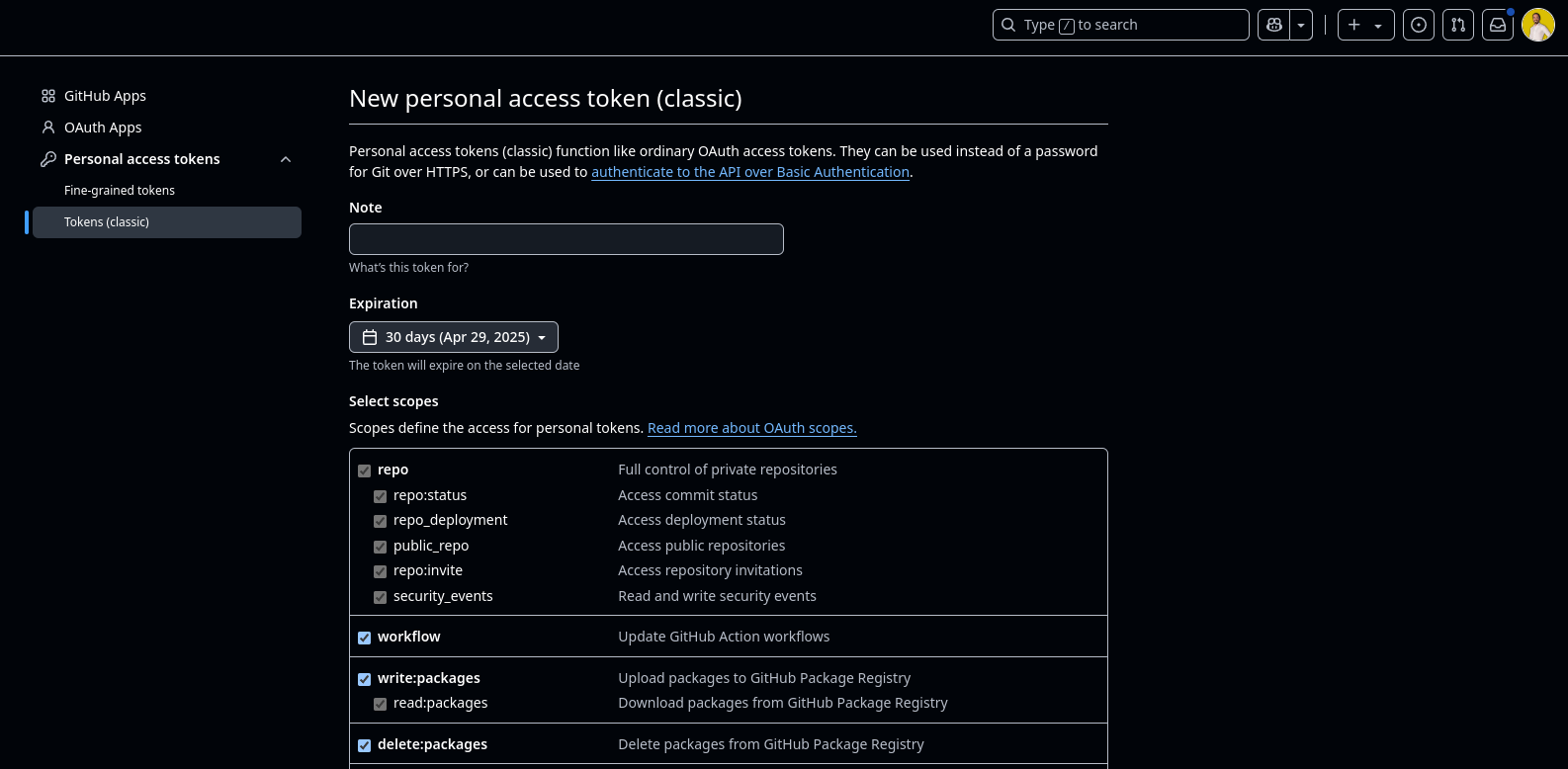
- And place it as secret and variables:
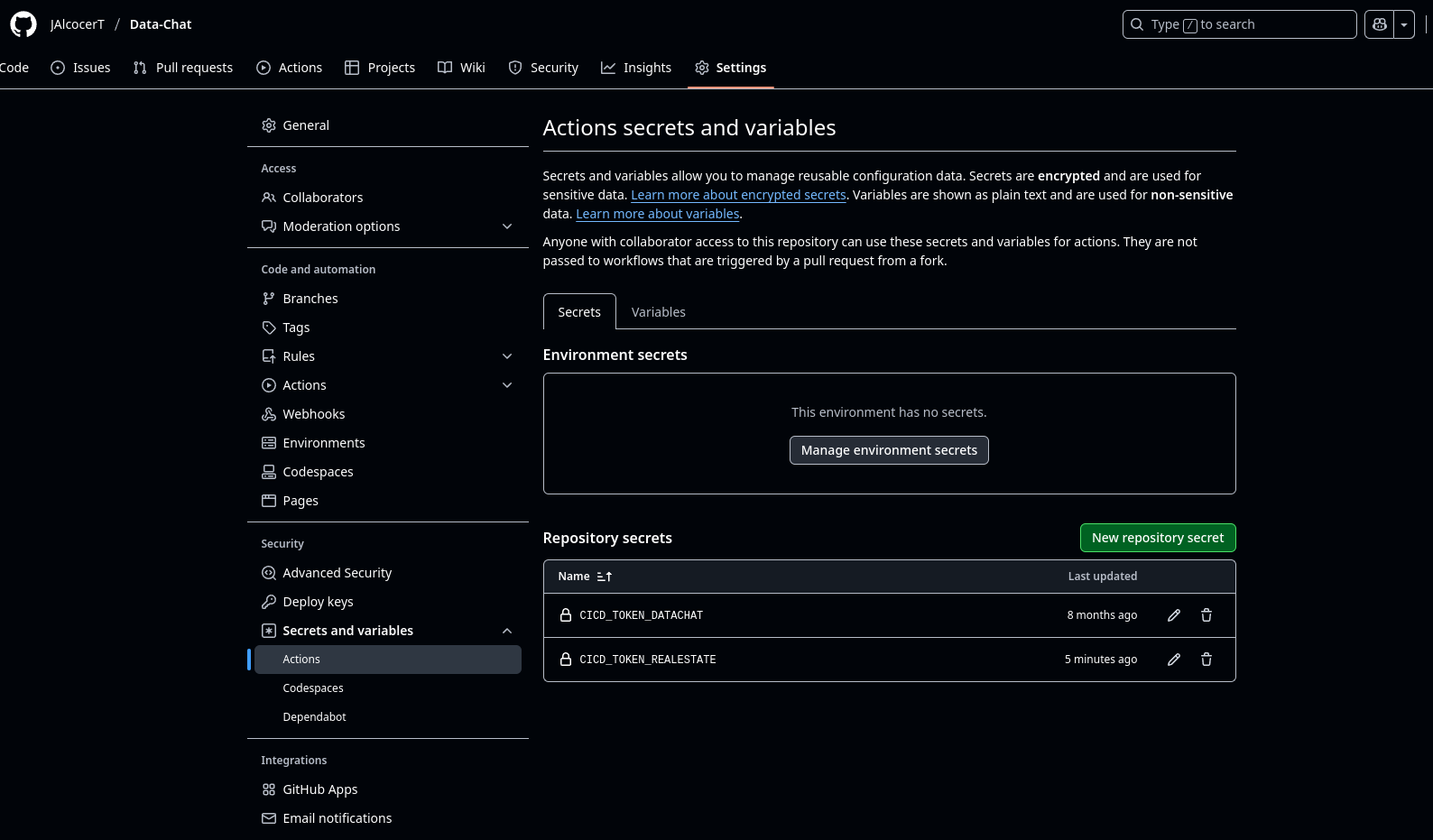
I was using at first GH Actions to create x86 container images and push them to ghcr like so:
Github Actions Build - Push to GHCR a x86 image 📌
#https://github.com/JAlcocerT/Py_Trip_Planner/blob/main/.github/workflows/ci-cd-dockerhub.yml
name: CI/CD Pipeline Build and Push to DockerHub
on:
workflow_dispatch: #trigger button
# push:
# branches:
# - main
jobs:
build-and-push:
runs-on: ubuntu-latest
steps:
- name: Checkout repository
uses: actions/checkout@v2
- name: Set up Docker Buildx
uses: docker/setup-buildx-action@v1
- name: Login to GitHub Container Registry
uses: docker/login-action@v1
with:
registry: ghcr.io
username: ${{ github.actor }}
password: ${{ secrets.CICD_TOKEN_MultiChat }} #Settings -> Dev Settings -> PAT's -> Tokens +++ Repo Settings -> Secrets & variables -> Actions -> New repo secret
- name: Build and push Docker image
uses: docker/build-push-action@v2
with:
context: .
push: true
tags: ghcr.io/jalcocert/streamlit-multichat:v1.0 #it will be pushed to this container registry as x86 image!MultiArch Containers - QEMU
But there is a better way - Create MultiArch images thanks to QEMU andpush them to ghcr:
Github Actions - PYthon QEMU Container 📌
#https://github.com/JAlcocerT/Streamlit-MultiChat/blob/main/.github/workflows/Streamlit_GHA_MultiArch.yml
name: CI/CD Build and push MultiArch Container
on:
# push:
# branches:
# - main
workflow_dispatch:
jobs:
build-and-push:
runs-on: ubuntu-latest
steps:
- name: Checkout repository
uses: actions/checkout@v2
- name: Set up QEMU
uses: docker/setup-qemu-action@v1
- name: Set up Docker Buildx
uses: docker/setup-buildx-action@v1
- name: Login to GitHub Container Registry
uses: docker/login-action@v1
with:
registry: ghcr.io
username: ${{ github.actor }}
password: ${{ secrets.CICD_TOKEN_MultiChat }}
- name: Build and push Docker image
uses: docker/build-push-action@v2
with:
context: .
push: true
platforms: linux/amd64,linux/arm64
tags: |
ghcr.io/jalcocert/streamlit-multichat:v1.1
ghcr.io/jalcocert/streamlit-multichat:latest When the workflow has finished, you will see:
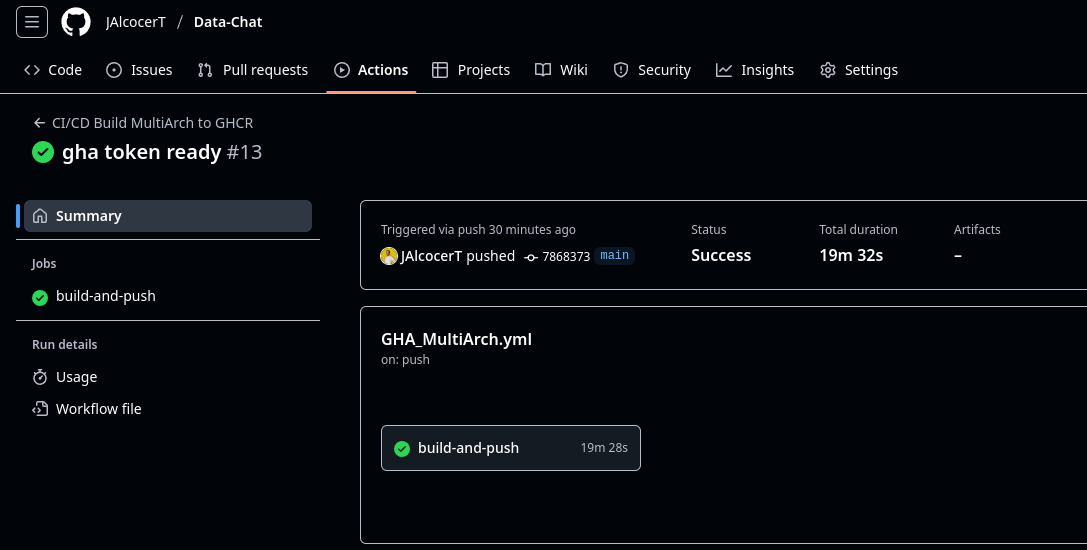
You can pull the image anytime from the container registry:the place where you have pushed all the docker images
docker pull ghcr.io/jalcocert/data-chat:realestate #example of data-chat repo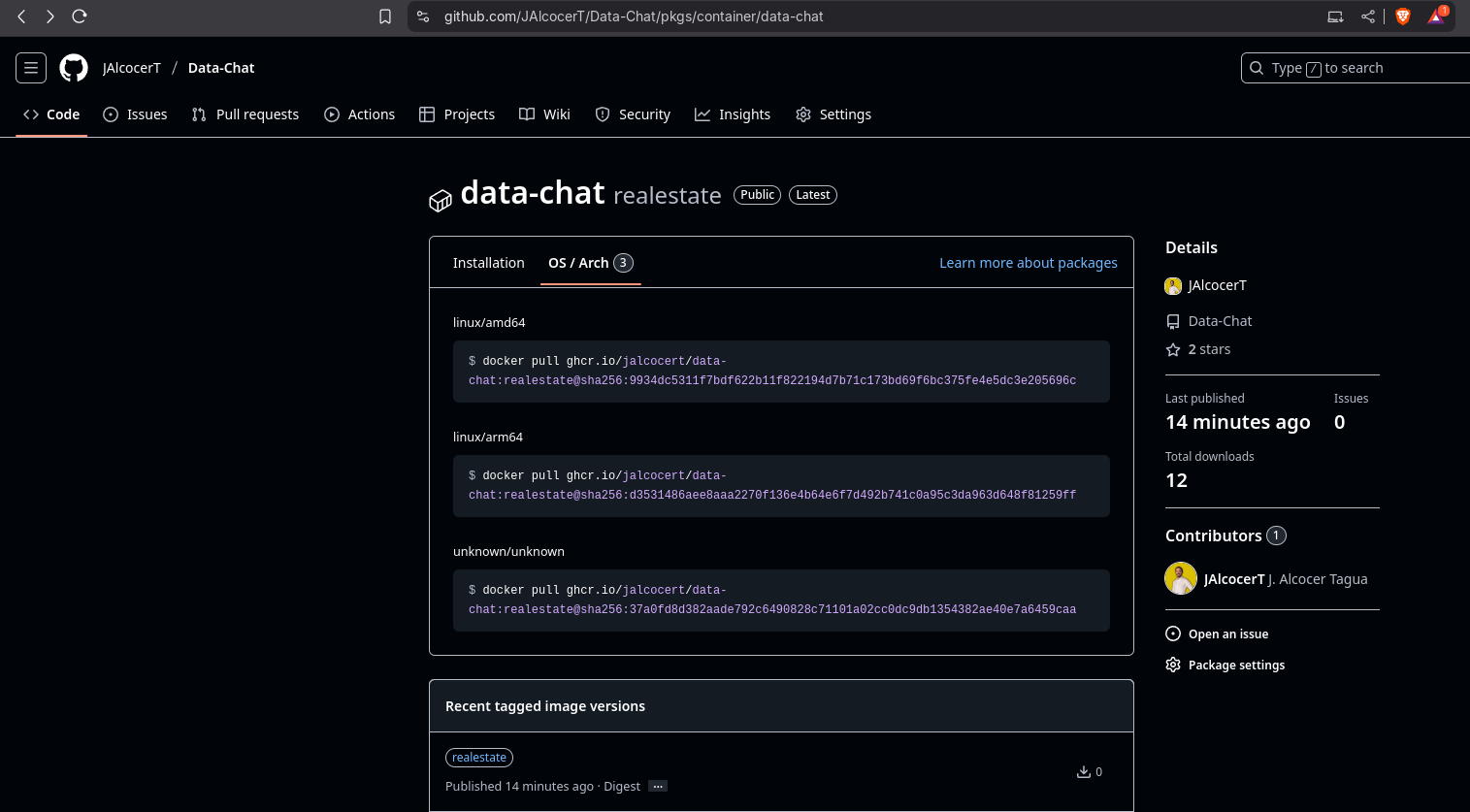
And use it accordingly with your docker-compose - Meaning, that you dont have to build the container image, if you dont want to!
You can also push containers to Dockerhub from GHA: you just need to provide the DockerHub PAT instead of the GHCR one
Github Actions Build - Push to DockerHUB | Example 📌
#https://github.com/JAlcocerT/Py_Trip_Planner/blob/main/.github/workflows/ci-cd-dockerhub.yml
name: CI/CD Pipeline Build and Push to DockerHub
on:
workflow_dispatch: #trigger button
# push:
# branches:
# - main
jobs:
build-and-push-x86:
runs-on: ubuntu-latest
steps:
- name: Checkout repository #get the source code
uses: actions/checkout@v2
- name: Set up Docker Buildx #install docker
uses: docker/setup-buildx-action@v1
- uses: actions/checkout@v1
- name: Build & Push Image to DockerHub
run: |
echo "${{ secrets.CICD_DASH_TOKEN_DOCKERHUB }}" | docker login -u "your_dockerhub_user" --password-stdin
docker image build -t your_dockerhub_user/trip_planner:amd64 .
docker push your_dockerhub_user/trip_planner:2-amd64 Github Actions for Web Projects
For pushing data to github pages you wont need to configure a PAT.
So its a little bit simpler than what we just saw with Python Apps and containers with GHA.
And Github Actions combined with static websites is pretty useful as well.
You can also see my docs for websites
Astro
With Astro, you can make beautiful websites
Github Actions Build and Push Astro Web to Github Pages 📌
#https://github.com/JAlcocerT/web3/blob/main/.github/workflows/deploy_astro.yml
name: Deploy Astro to GitHub Pages
on:
push: #option 1
branches: [main]
workflow_dispatch: #option2
permissions:
contents: read
pages: write
id-token: write
jobs:
build:
runs-on: ubuntu-latest
steps:
- name: Check out your repository using git
uses: actions/checkout@v2
- name: Use Node.js 18
uses: actions/setup-node@v2
with:
node-version: '18'
cache: 'npm'
- name: Install dependencies
run: npm ci
- name: Build Astro
run: npm run build --if-present
- name: Upload artifact
uses: actions/upload-pages-artifact@v1
with:
path: ./dist
deploy:
environment:
name: github-pages
url: ${{ steps.deployment.outputs.page_url }}
runs-on: ubuntu-latest
needs: build
steps:
- name: Deploy Astro Generated files to GitHub Pages
id: deployment
uses: actions/deploy-pages@v1Hugo
If you dont know about it, with HUGO you can make very quick websites
https://github.com/JAlcocerT/JAlcocerT/blob/main/.github/workflows/pages.yaml
name: Deploy Hugo site to GH Pages
on:
push:
branches: ["main"]
workflow_dispatch:
permissions:
contents: read
pages: write
id-token: write
concurrency:
group: "pages"
cancel-in-progress: false
defaults:
run:
shell: bash
jobs:
# Build job
build:
runs-on: ubuntu-latest
env:
HUGO_VERSION: 0.117.0
steps:
- name: Checkout
uses: actions/checkout@v4
with:
fetch-depth: 0
- name: Setup Go
uses: actions/setup-go@v4
with:
go-version: '1.21'
- name: Setup Hugo
uses: peaceiris/actions-hugo@v2
with:
hugo-version: '0.117.0'
extended: true
- name: Build with Hugo
env:
HUGO_ENVIRONMENT: production
HUGO_ENV: production
run: |
hugo --gc --minify --baseURL "https://${{ github.repository_owner }}.github.io/${{ github.event.repository.name }}/"
- name: Upload artifact
uses: actions/upload-pages-artifact@v2
with:
path: ./public
# Test job (can be skipped if it fails)
test:
runs-on: ubuntu-latest
needs: build
continue-on-error: true # This allows the job to fail without failing the entire workflow
steps:
- name: Checkout
uses: actions/checkout@v4
with:
fetch-depth: 0
- name: Install linkchecker
run: sudo apt-get install -y linkchecker
- name: Run LinkChecker
run: |
linkchecker ./public/ \
--ignore-url "/^http:\/\/127.0.0.1/,/^http:\/\/0.0.0.0/,/^http:\/\/localhost/" || echo "LinkChecker found errors, but continuing..."
# Deploy job
deploy:
environment:
name: github-pages
url: ${{ steps.deployment.outputs.page_url }}
runs-on: ubuntu-latest
needs: build
steps:
- name: Deploy to GitHub Pages
id: deployment
uses: actions/deploy-pages@v2SliDev
With Slidev we can do PPTs as a Code, which pretty much resonates with AI assistants

SliDev to Github Pages 🚀
#https://github.com/JAlcocerT/Streamlit-MultiChat/blob/main/.github/workflows/SliDev_CICD.yml
name: Deploy Slidev site to GH Pages
on:
# push:
# branches: ["main"]
workflow_dispatch:
permissions:
contents: read
pages: write
id-token: write
concurrency:
group: "pages"
cancel-in-progress: false
defaults:
run:
shell: bash
jobs:
build:
runs-on: ubuntu-latest
env:
NODE_VERSION: 18
steps:
- name: Checkout
uses: actions/checkout@v4
with:
fetch-depth: 0
- name: Setup Node.js
uses: actions/setup-node@v2
with:
node-version: ${{ env.NODE_VERSION }}
- name: Install dependencies
run: |
cd ./slidev
npm install
- name: Build Slidev project
run: |
cd ./slidev
npm install -g @slidev/cli #npm install --save-dev @slidev/cli
npm i -D playwright-chromium
slidev build --base /Streamlit-MultiChat/
- name: Upload artifact
uses: actions/upload-pages-artifact@v2
with:
path: ./slidev/dist
deploy:
environment:
name: github-pages
url: ${{ steps.deployment.outputs.page_url }}
runs-on: ubuntu-latest
needs: build
steps:
- name: Deploy to GitHub Pages
id: deployment
uses: actions/deploy-pages@v2See the workflow yml
Jekyll
#https://github.com/JAlcocerT/RPi/blob/main/.github/workflows/pages-deploy.yml
name: "Build and Deploy Jekyll to GH Pages"
on:
push:
branches:
- main
- master
paths-ignore:
- .gitignore
- README.md
- LICENSE
# Allows you to run this workflow manually from the Actions tab
workflow_dispatch:
permissions:
contents: read
pages: write
id-token: write
# Allow one concurrent deployment
concurrency:
group: "pages"
cancel-in-progress: true
jobs:
build:
runs-on: ubuntu-latest
steps:
- name: Checkout
uses: actions/checkout@v4
with:
fetch-depth: 0
# submodules: true
# If using the 'assets' git submodule from Chirpy Starter, uncomment above
# (See: https://github.com/cotes2020/chirpy-starter/tree/main/assets)
- name: Setup Pages
id: pages
uses: actions/configure-pages@v4
- name: Setup Ruby
uses: ruby/setup-ruby@v1
with:
ruby-version: 3.3
bundler-cache: true
- name: Build site
run: bundle exec jekyll b -d "_site${{ steps.pages.outputs.base_path }}"
env:
JEKYLL_ENV: "production"
# - name: Test site
# run: |
# bundle exec htmlproofer _site \
# \-\-disable-external \
# \-\-ignore-urls "/^http:\/\/127.0.0.1/,/^http:\/\/0.0.0.0/,/^http:\/\/localhost/"
- name: Upload site artifact
uses: actions/upload-pages-artifact@v3
with:
path: "_site${{ steps.pages.outputs.base_path }}"
deploy:
environment:
name: github-pages
url: ${{ steps.deployment.outputs.page_url }}
runs-on: ubuntu-latest
needs: build
steps:
- name: Deploy to GitHub Pages
id: deployment
uses: actions/deploy-pages@v4Workers and Pages
If you have used Cloudflare WnP, you have implicitely used CI/CD already:
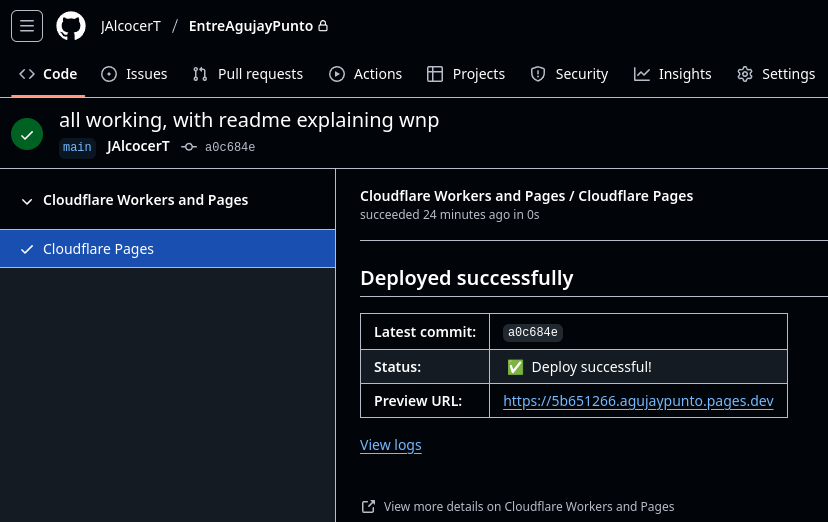
GHA for R Projects
Actions CI/CD for Shiny
See this GH Actions config file
Github CI/CD for Flexdashboards
Use static deploy, as seen on the static.yml GH Actions workflow at the RStocks Project.
 FlexDashboard RStocks
FlexDashboard RStocksConclusions
To test your GHA workflows locally, try: https://github.com/nektos/act
Run your GitHub Actions locally 🚀
FAQ
Other Useful CI/CD Tools
Cloudflare WnP with your Repos
If you are familiar with static sites, you can have them build and pushed to Cloudflare Pages also via CI/CD.
